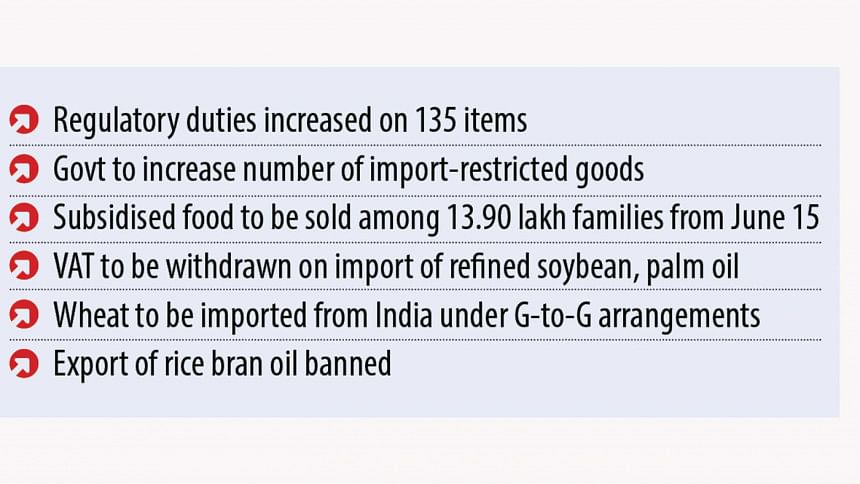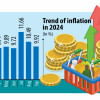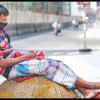Inflation, forex pressure: Govt moves to rein them in

The government has ramped up its measures to contain the pressure on foreign currency reserves and inflation, drafting an action plan to discourage non-essential imports and bring relief to the poor and the vulnerable from the spiralling cost of living.
To help people struggling to get essentials, the VAT on the import of refined soybean, palm, rapeseed, canola and olive oil will be withdrawn, said sources. The export of rice bran oil has already been banned.
The government is also trying to stop the decline in foreign reserves by discouraging unnecessary imports and suspending virtually all official tours abroad by government and Bangladesh Bank officials, employees of autonomous, state-owned, semi-government organisations and banks.
Projects with high import components have also been deferred.
The import duty on 135 products, including flowers, fruits, furniture and cosmetics, has been raised to 20 percent. It was zero to three percent before, said the National Board of Revenue (NBR) yesterday.
Apart from discouraging unnecessary imports, it said the increased duty would help develop domestic industries, save valuable foreign exchange reserves and increase revenue.
As of May 19, Bangladesh had $42.3 billion in reserves -- enough to cover just about five months' import bills. In August last year, the reserves hit a record $48.1 billion.
Contracting remittance inflow since last year and rebounding imports put reserves under pressure, exacerbated by Russia's invasion of Ukraine.
This led to the taka losing its value against the dollar.
The official taka-dollar exchange rate is Tk 87.9, up from Tk 84.8 at the beginning of the fiscal year. However, in the kerb market, the exchange rate is as high as Tk 100 as greenbacks are proving hard to get hold of.
Prime Minister Sheikh Hasina at the cabinet meeting on Thursday questioned the necessity of importing foreign fruits, like apples, at a time when summer fruits are aplenty, The Daily Star has learnt from participants at the meeting.
Subsequently, she directed the finance and commerce ministries and the central bank to find ways to cool down the demand for dollars.
Hasina, at a meeting of the National Economic Council on May 17, has called upon the people to practise austerity and be careful about spending in the face of a global economic slowdown.
Meanwhile, Bangladesh Bank has also sought the cooperation of the Bangladesh Foreign Exchange Dealers' Association.
In the first nine months of the fiscal year, import payments amounted to $61.5 billion, up 44 percent from a year earlier.
The volume of imports did not soar as much, but the global inflation tipped the value of imports, particularly of commodities.
The higher import value of commodities means the prices of essentials are racing beyond the means of the poor and the low-income people.
To alleviate their sufferings, the government will be taking a series of initiatives in the coming days, The Daily Star has learnt from commerce ministry officials.
From June 15, the government will start selling foodstuff at subsidised rates among 13.90 lakh families under family cards across the country, except in Dhaka and Barishal cities.
Cardholders can buy two litres of soyabean oil, two kgs of lentils and a kg of sugar at subsidised rates from dedicated dealer shops in wards.
The authorities will also import wheat from India under the government-to-government arrangements and the Trading Corporation of Bangladesh will directly buy essentials from external sources from next month.
The authorities have urged businesses to ramp up the import of soybean and other edible oils and requested the agriculture ministry to initiate moves to increase the production of soybean, rapeseeds, and sunflower.
The government will set aside adequate allocation in the upcoming budget to give some relief to the poor and low-income groups, said M Shamsul Alam, state minister for planning.
"Besides, we will not assess the new projects involving foreign purchase for the time being," he told The Daily Star yesterday. "The implementation of low-priority projects will be pushed by a few months. We are working on it."


 For all latest news, follow The Daily Star's Google News channel.
For all latest news, follow The Daily Star's Google News channel. 








Comments